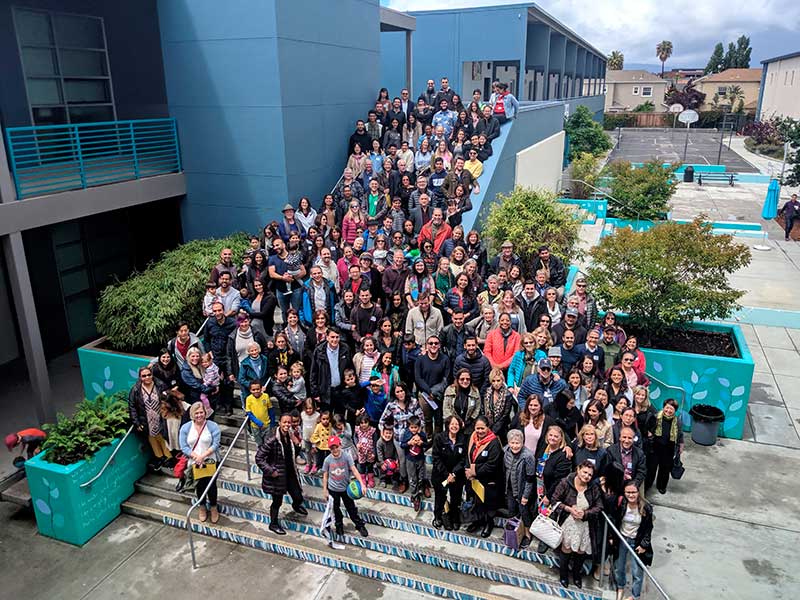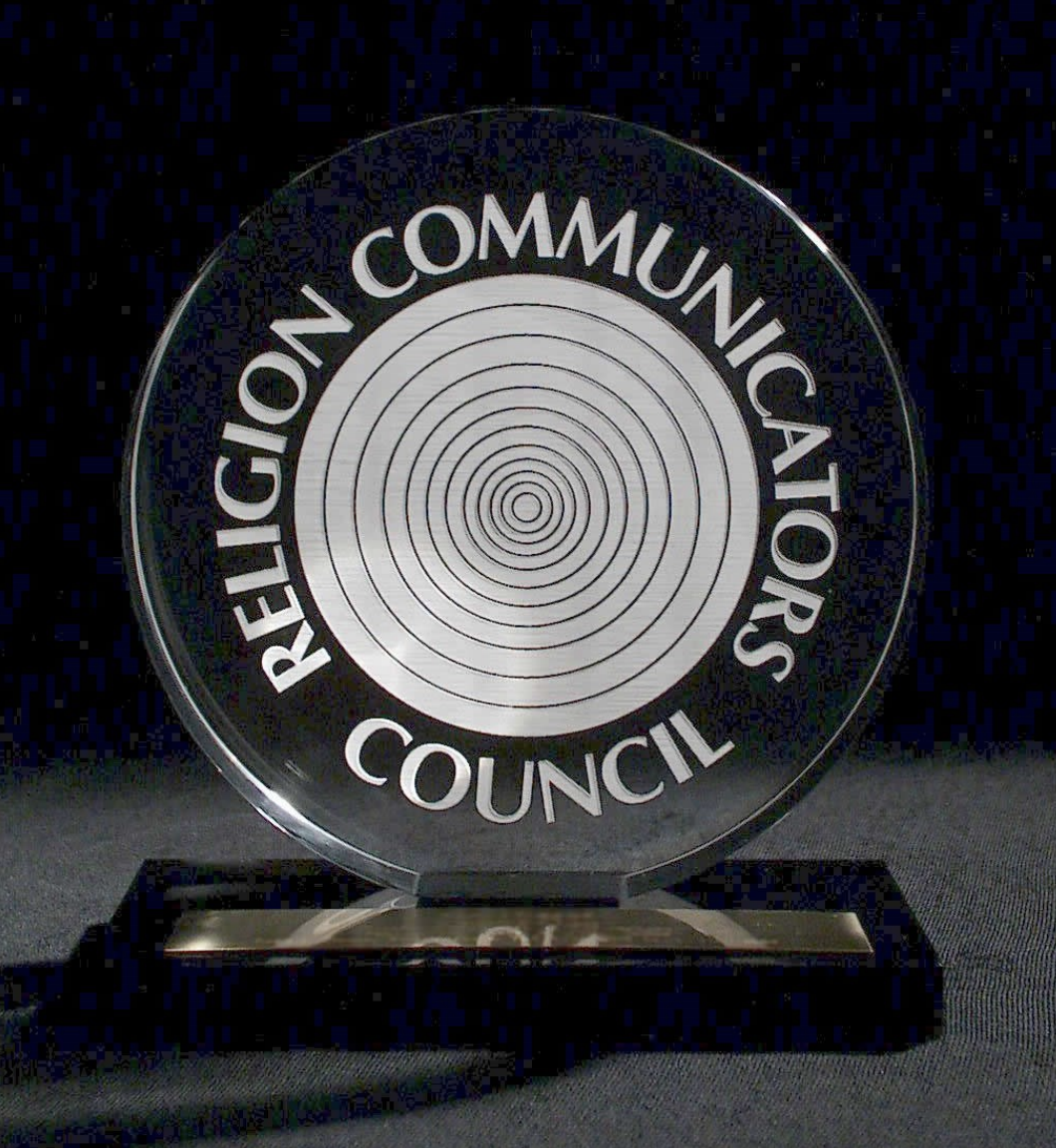
Scaled-down summer school brings Georgians into significant conversations on race
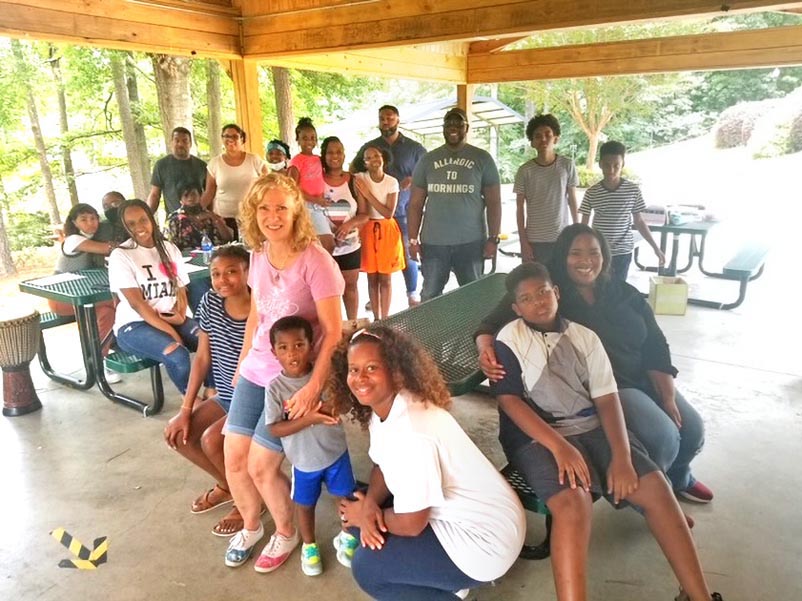
By Francisco Rendon
The sun shone bright on July 23 as families gathered at Hiram Park to sing songs, study materials about race amity, and eat together at an in-person session of the Georgia Baha’i Seasonal School in Hiram, Georgia.
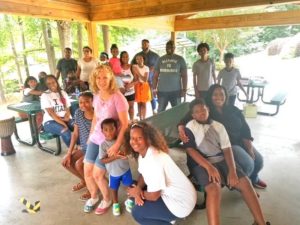
Over four hours the 20 or so participants, which included six families, divided into age groups to study and discuss themes from the “Walking Together on a Path toward Race Amity and Oneness, Part 2” seasonal school curriculum, then they convened as a whole for further conversation, then sing-along songs with African drumming. The four-hour event concluded with lunch and snow cones from a local food truck.
Discussions to organize the July gathering had begun soon after a March videoconference in which a Georgia group studied “Walking Together on a Path toward Race Amity and Oneness, Part 1” materials.
“Typically in the past we would have a weekend-camp type of situation. Of course [while still dealing with a pandemic] we couldn’t do that, so we thought maybe we could host something on a smaller scale, targeting a few families, having conversations about race amity using curriculum provided by the national office [of Education and Schools],” says Natelege Swainson-Hemmings of the Georgia Baha’i Seasonal School Committee. “So we decided to have something in a local park in the area, outside, and somehow to try to incorporate the arts into it.”
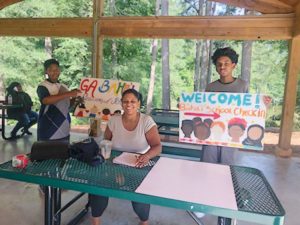 Though on a smaller scale than past seasonal schools, the more-intimate setting fit with a nationwide movement this year to hold more-focused Baha’i summer school sessions at the level of a neighborhood or local area, often gathering families who are participating in community-building efforts together.
Though on a smaller scale than past seasonal schools, the more-intimate setting fit with a nationwide movement this year to hold more-focused Baha’i summer school sessions at the level of a neighborhood or local area, often gathering families who are participating in community-building efforts together.
Ahead of time, the committee excerpted and modified the “Race Amity Part 2” curriculum to fit a gathering of only a few hours, and created materials and activities for the different age groups.
At the event, attendees spoke about the pain that racism had caused them throughout their lives, the different forms racism can take in the United States, and the necessity of divine assistance to move past the scourge of racism and to heal generational wounds and trauma.
Swainson-Hemmings says an informal atmosphere made it easier to have conversations on such weighty subjects. Most attendees at the event were Black Baha’is, with an Asian-American family and a few white people also attending.
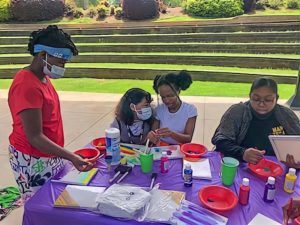 Marteen Smith, who taught the children’s class at the event, says the children drew pictures after studying the materials. “The kids were able to listen, there were a lot of open-ended questions,” Smith says, adding that she was surprised at the depth of conversation from the young participants. “The insight they gave me was very powerful, even from my own 8-year-old.”
Marteen Smith, who taught the children’s class at the event, says the children drew pictures after studying the materials. “The kids were able to listen, there were a lot of open-ended questions,” Smith says, adding that she was surprised at the depth of conversation from the young participants. “The insight they gave me was very powerful, even from my own 8-year-old.”
The 12- to 14-year-olds, some of whom participate regularly in Baha’i-organized junior youth groups, shared that they have seen racism taking the form of bullying at school. In the large group, the young people had a powerful dialogue with adults about how to deal with racism when they encounter it in their lives.
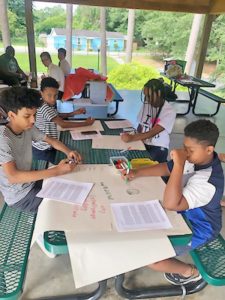 The adults studied materials on themes of justice and trust in God. In discussing those themes they shared their own experiences with racism.
The adults studied materials on themes of justice and trust in God. In discussing those themes they shared their own experiences with racism.
As a young adult, Volari Taqi Morgan says, she had experiences within her Baha’i community related to racism that led to a feeling of estrangement for a number of years. Now, she says, events like this are crucial, in that they provide people a space to process those experiences, to learn from each other, and to understand the context in which the work of race amity takes place.
“What we are experiencing now is a lot of hurt and a lot of trauma, around the country,” Morgan says. “But if we can’t communicate with each other and have open, two-way conversation, we will have even more we have to deal with. How — in the Baha’i community — are we supposed to invite people into our community if we can’t even talk to each other about these issues?”
Dealing with these issues can benefit Baha’i involvement in the wider community as well, she indicates. “We are doing this work of healing and we still have more work to do. Now, we can go out into the community and we can have this same level of openness and make true, meaningful connections with those we look forward to serving alongside.”
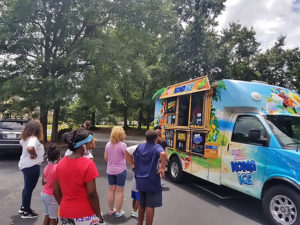 A highlight from the day, several attendees share, was participation by two young Mormon men, both white, who were in the park that morning and met the attendees while the event was being set up. The two later returned and said they felt attracted to the seasonal school session because “it feels good over here.”
A highlight from the day, several attendees share, was participation by two young Mormon men, both white, who were in the park that morning and met the attendees while the event was being set up. The two later returned and said they felt attracted to the seasonal school session because “it feels good over here.”
The two men stayed for lunch, discussed the materials, and took some time to learn about the Baha’i Faith. “They kept thanking us and talking about the material … saying ‘This is good stuff,’” Morgan says.
The committee hopes to hold similar small events in other parts of Georgia in the coming seasons, Swainson-Hemmings says. Particularly, the committee hopes upcoming gatherings will have a more diverse representation from the Baha’i community and the wider community.
It’s important for white people to “take up the banner” of working for racial justice alongside people of color, Swainson-Hemmings says. “It takes all of us. It’s not just a Black issue, it’s an everyone issue.”
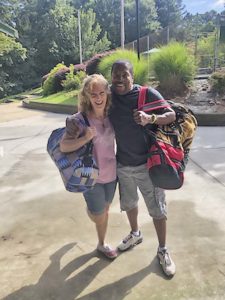 Maria Bradfield, who also helped organize the gathering, says love of God and Baha’u’llah have helped her deal with racism her entire adult life and she just wants to be able to share that power with more people.
Maria Bradfield, who also helped organize the gathering, says love of God and Baha’u’llah have helped her deal with racism her entire adult life and she just wants to be able to share that power with more people.
Bradfield notes a teaching in the Baha’i Faith: “If a man has ten good qualities and one bad one, to look at the ten and forget the one; and if a man has ten bad qualities and one good one, to look at the one and forget the ten.”
She observes, “Even though as a society we might not be able to do that yet, when I see the racism in a lot of society, I try to see things through the eyes of God. It makes it so much easier to deal with the racism and hate.”
The summer school, she says, “was just beautiful … all of us working together at this event with children, friends from the wider community. We are getting the word out that the Faith teaches that unity is for everybody. That’s what is needed right now.”


